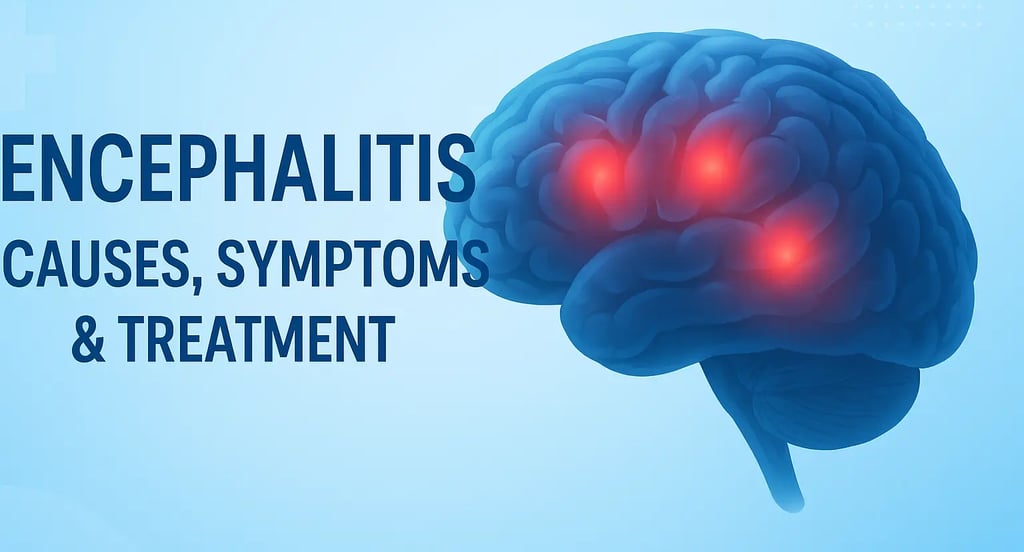Encephalitis: Causes, Symptoms, Diagnosis, and Treatment
Learn what encephalitis is, its causes, symptoms, risk factors, and treatment options. Discover how early diagnosis and prevention can reduce long-term complications.


What is Encephalitis?
Encephalitis is a serious medical condition defined as inflammation of the brain, usually caused by viral infections, bacterial infections, or autoimmune reactions. This inflammation disrupts normal brain function and can lead to cognitive problems, seizures, behavioral changes, or even loss of consciousness.
The condition is relatively rare, affecting about 1–5 people per 100,000 annually, but it remains a major public health concern. While some patients recover fully, others may experience long-term neurological complications. Early recognition and prompt treatment are crucial for better outcomes.
Causes of Encephalitis
Encephalitis is broadly divided into infectious and non-infectious causes:
1. Infectious Encephalitis
Viral causes (most common):
Herpes simplex virus (HSV) – a leading cause of severe encephalitis
West Nile virus – mosquito-borne infection
Enteroviruses and mumps virus (especially in unvaccinated individuals)
Bacterial causes (less common):
Listeria monocytogenes
Streptococcus strains (in immunocompromised patients or during pregnancy)
2. Autoimmune Encephalitis
In this form, the immune system mistakenly attacks healthy brain tissue. A notable example is anti-NMDA receptor encephalitis, which can cause severe neurological and psychiatric symptoms.
Risk Factors
Weakened immune system
Very young or elderly age groups
Travel to areas with high mosquito-borne diseases
Lack of vaccination against viruses like mumps or Japanese encephalitis
Prevention
Vaccination (e.g., Japanese encephalitis, mumps, measles, rubella)
Mosquito control and personal protection in endemic areas
Strong immune health through proper nutrition and medical care
Symptoms of Encephalitis
Symptoms of encephalitis vary depending on severity but often start like flu and progress to neurological issues.
Early Symptoms:
Fever
Headache
Fatigue or body aches
Neurological Symptoms:
Confusion and memory problems
Altered behavior or hallucinations
Seizures (generalized or focal)
Sensitivity to light
Stiff neck
Severe Symptoms:
Difficulty speaking or weakness in limbs
Loss of consciousness
Coma in extreme cases
⚠️ Immediate medical attention is required if seizures, confusion, or sudden behavioral changes occur.
Diagnosis of Encephalitis
Doctors may use:
Neurological examination
MRI or CT scans to detect brain inflammation
Lumbar puncture (spinal tap) for cerebrospinal fluid analysis
Blood tests to identify viral, bacterial, or autoimmune markers
Early diagnosis significantly improves recovery chances.
Treatment Options for Encephalitis
Treatment depends on the underlying cause:
Viral Encephalitis
Antiviral drugs (e.g., acyclovir for HSV)
Supportive care to reduce fever and inflammation
Bacterial Encephalitis
Intravenous antibiotics
Hospital monitoring for complications
Autoimmune Encephalitis
Corticosteroids to suppress the immune response
Immunotherapy in severe cases
Supportive & Long-Term Care
Hospitalization for severe cases (hydration, respiratory support, monitoring)
Physical therapy, occupational therapy, and cognitive rehabilitation for survivors with lasting neurological damage
Emerging Treatments
New research explores monoclonal antibodies and advanced antivirals, offering hope for more targeted therapies in the future.
Conclusion
Encephalitis is a life-threatening neurological condition that requires immediate medical attention. Recognizing early symptoms such as fever, headache, confusion, and seizures can save lives. Preventive measures like vaccination, mosquito control, and timely medical care play a crucial role in reducing the risk.
With advancements in treatment and rehabilitation, many patients can recover, but awareness and early intervention remain the key to improving outcomes.
Frequently asked questions
1. Can encephalitis be cured?
Encephalitis can often be treated successfully if diagnosed early. Viral encephalitis may be managed with antiviral drugs, while bacterial encephalitis requires antibiotics. Autoimmune encephalitis is treated with corticosteroids or immunotherapy. Some patients recover fully, but others may experience long-term neurological effects.
4. Is encephalitis contagious?
Encephalitis itself is not directly contagious, but the viruses that cause it (like HSV or West Nile virus) can spread through mosquito bites, respiratory droplets, or close contact. Preventive measures such as vaccination and mosquito control help reduce the risk.
2. What is the most common cause of encephalitis?
The most common cause is viral infections, especially the herpes simplex virus (HSV). Other viruses like West Nile virus, mumps, and enteroviruses also contribute.
5. What are the long-term effects of encephalitis?
Some patients may fully recover, while others experience:
Memory loss
Speech or language problems
Seizures
Cognitive or behavioral changes
Muscle weakness
3. How is encephalitis diagnosed?
Doctors use a combination of:
MRI or CT scans to detect brain swelling
Lumbar puncture (spinal tap) to analyze cerebrospinal fluid
Blood tests to identify infections or autoimmune markers
Neurological exams to assess symptoms
6. Who is at higher risk of encephalitis?
Infants and young children
Elderly adults
People with weakened immune systems
Individuals traveling to regions with mosquito-borne diseases
7. How can encephalitis be prevented
Vaccination (MMR, Japanese encephalitis, etc.)
Mosquito protection (nets, repellents, covering clothes)
Good hygiene practices to reduce viral spread
Strengthening immunity through a healthy lifestyle
